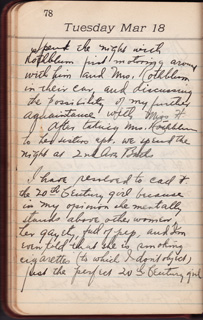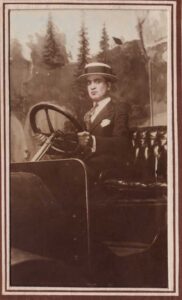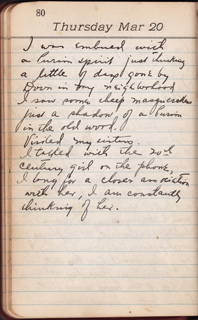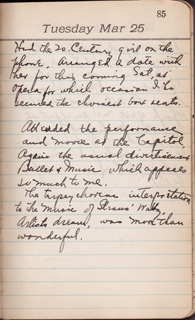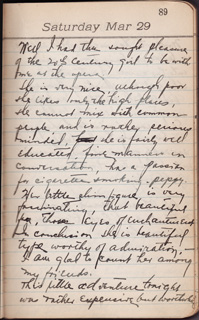
It was like a dream. My
last night’s experience, I will
try to have my dream repeated,
Visited Freidas children
Incidentally met the
Sherman sisters at Jeans house
Jean tells me that the Rose
Sh. cares for me which makes
me feel bad as I haven’t any
interest in her. —
I shall wait for the
certain girl and with certain
qualities.
I either I met heror and I’m hopefull of meeting
her again or I am have yet
to find her.
———————
Matt’s Notes
Looks like Papa was officially smitten with the woman he met the night before, when he shared with her an epic, movie montage of a subway ride “from the farthest point in Brooklyn to the farthest point in the Bronx.” He couldn’t have slept much — he got home at 5:00 AM and I’m sure he was far too dutiful to be a late sleeper — but the first thing he did in the morning was grab his diary and get his excitement on paper. His romantic mind is hard at work, turning his encounter into “a dream,” something more than just a long ride, a memory he cherishes as if he were remembering it twenty years hence as the start of something big.
It’s quite a thing to be single and struggling in New York City. Every conversation is heady with potential, every flirtation could be the turn you took, every subway platform could be the stage for act I. (I went through a little Roosevelt Island Tram phase myself, though Papa’s aphrodisiac seems to have been the BMT.) And the more strange dramas the real world forces on you — your faraway father is ill, like Papa’s was, and you don’t even know what he looks like anymore — the more you believe the unexpected must work the other way, too, that a two-hour subway ride you didn’t see coming has the power to make everything different.
Wait: Papa was a living, breathing, young man, too, not just a nexus of plotlines and motivations; he had almost no choice but to get excited about the woman he’d met. I like this entry because it shows his excitement and immersion in this moment so clearly — the uncharacteristically hurried handwriting, the crossed-out letters, the free associative weighing of what happened to him the previous night. He reveals it in the way he discusses “Rose,” the woman cousin Jean is nudging him toward. She’s not his speed, he’s really sorry, but she just doesn’t have those “certain qualities” he’s looking for. But we know who does, right? Well, let’s not go that far, he tells himself, let’s be objective, “I shall wait for the certain girl,” whoever that might be, but in a flash he’s back to the night before: “I either met her, or am hopefull of meeting her again,” written as if they are two separate options but, of course, refer only to his subway companion.
He checks his tone one last time, cautioning himself that maybe “I have yet to find her,” but he can’t contain his excitement. He wants to have the “dream repeated.” Who could blame him, but who wouldn’t tell him to be careful?

